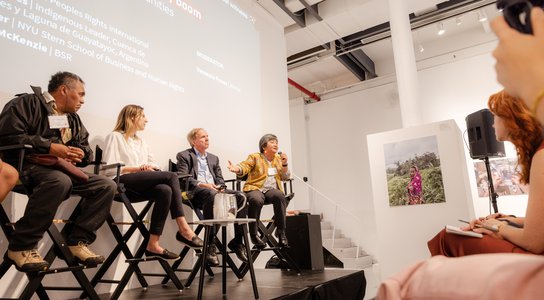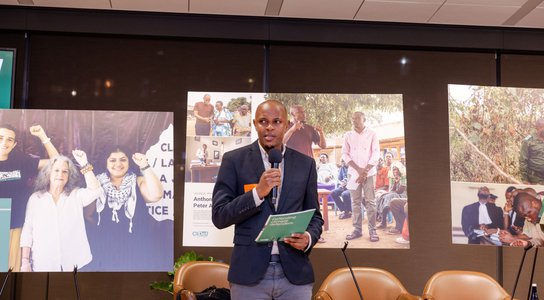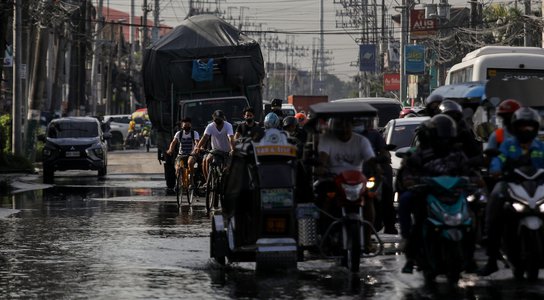Against the backdrop of a record-shattering heat wave across North America, 27 climate champions, activists and leaders from six continents came together last month to share inspiring climate stories and solutions in our virtual event, “Time for a Climate Revolution.”
They spoke of the impacts of climate crisis they’ve experienced, the ongoing frontline battles taking on extractive industries in their communities, how they are building political power for real action, and the need for a just and equitable energy transition.
Now as the world braces for another summer of climate crisis-induced chaos, and global leaders prepare for the COP26 global climate summit in Glasgow, UK later this year, we must ask: how do we continue the momentum for real systems change to protect people and planet – and push back against the rhetoric of empty promises and corporate greenwashing?
Here are some key takeaways we heard on building a #ClimateRevolution:
1: “The Green New Deal isn’t just a resolution; It’s a revolution.”
As US Senator Ed Markey, champion of the Green New Deal in the US, kicked things off, he recognized the urgency of systemic change needed to take on the drivers of climate crisis. “The Green New Deal isn’t just a resolution; It’s a revolution of everyday people who have taken to the streets and the ballot box to make jobs, justice and climate action central to our political system.”
2: Big Oil and Gas use the playbook of Big Tobacco – but academics, campaigners and activists are fighting back.
Our first panel
explored how we can tackle greenwashing and take back the climate narrative. When
it comes to greenwashing from big polluters, what we’re really talking about is
climate deception in all its forms, described Dr. Geoffrey Supran,
Research Fellow at Harvard University. But in fighting back, we can take a page
out of the lessons learned from fighting Big Tobacco, bringing together academic
and journalistic investigations, lawsuits, and activism – all while pushing
politicians to step up.
As an example, Jamie Henn of Fossil Free Media outlined the innovative Clean Creatives campaign pressuring PR and ad agencies to cut ties with fossil fuel companies, just as they did with tobacco companies decades ago. Through another approach, Zorka Milin, Senior Advisor at Global Witness, described a groundbreaking legal complaint in which the organization joined partners in asking the US Federal Trade Commission (FTC) to crack down on greenwashing by fossil fuel companies.
3. It’s important to recognize how the climate emergency is showing up around us.
Alexandria
Villaseñor, climate
justice activist in the US and founder of Earth Uprising, began her activism at
13 years old after experiencing devastating California wildfires in 2018. She
described how the climate crisis continues to show up all around us:
“I’m back in Northern California right now, and after the devastating wildfires in 2020, we are gearing up for what climate scientists are saying might be the worst wildfire season ever. We’re in a record drought, have record dryness, and today is the start of major heatwaves all along the west coast. Where I am, temperatures will pass 110 degrees Fahrenheit. We are in a climate emergency, and it’s why we need to keep doing this work together.”
4: “It is now time to center our people before profits.”
Samantha Kuman, with the Centre for Environmental Law and Community Rights in Papua New Guinea, shared just how the extractive industry undermines the health, human rights and wellbeing of our communities and planet. It’s a scene that she and others in her country are fighting back against as the coal industry risks locking the region into polluting energy: “The Pacific is not a dumping ground for unutilized coal. We as a people and a region are already fighting for our land, our lives and to stay above water. It is now time to center our people before profits. This decade of ecosystem restoration begins with us.”
5: Tracing the money behind climate destruction reveals a complicit financial system, a predatory economic model, and the need for systemic change.
Our next panel hit back at the institutions financing climate-wrecking industries and projects from fossil fuels to deforestation “If you take away the finance, you take away the pollution,” shared Adam McGibbon, UK Campaign Lead for Market Forces. Joined by Tariq Fancy, founder and CEO of the Rumie Initiative, and Seema Joshi, Director of Campaigns for Global Witness, the need for systemic change and robust regulatory action shone through. Fancy, formerly with BlackRock, described the failures of financial institutions to self-regulate: “I can’t be more explicit about this: Wall Street is structured to finance anything that is profitable, and legal.” Joshi affirmed: “We cannot let business continue as usual.”
6: We must move away from a scarcity mindset and tackle climate crisis cooperatively.
In a powerful keynote address, Jacqui Patterson, director of the Environmental and Climate Justice Program at the NAACP, concluded with an analysis of how the scarcity mindset must be overcome to truly achieve climate justice: “People are seeing that the solution is shifting away from a society rooted in exploitation and domination to one rooted in caring and cooperation -- a true notion of all for one and one for all and of deep democracy.”
7: Governments must do more to protect land and environmental defenders.
Nicki Becker, youth climate activist in Argentina, described how the Escazú Agreement, an environmental treaty between Latin American and Caribbean countries, is a significant step in linking human rights and the environment. But governments must do more to protect those standing up to protect our land, water and air. Global Witness’s annual report into the killings of land and environmental defenders around the world showed the highest number yet murdered in a single year: 212 land and environmental defenders were killed in 2019, an average of more than four people a week.
8: Industry lobbyists need to be cut out of policymaking. That includes at COP discussions.
A panel with Barnaby
Pace, Senior Campaigner for Global Witness, Myriam Douo, Corporate Capture
Campaigner for Friends of the Earth Europe, and Professor Jennifer Jacquet,
Associate Professor in the Department of Environmental Studies at New York
University discussed curbing political influence of climate-wrecking
industries. This shone a light on the Fossil
Free Politics campaign
pushing to shut fossil fuel industry lobbyists out of climate and energy policy
in the same way tobacco lobbyists are excluded from health policy. (Make sure
to follow along our Twitter bot @EUgasdetector as it automatically tweets out when a
gas industry lobbyist meets with an EU commissioner.)
US Senator Whitehouse described a similar situation of industry-captured politics in the US: “You will hear CEOs of fossil fuel companies say that they take climate change seriously. But they have not turned off the apparatus they have built over decades doing everything It can to block climate action and propagate climate denial, or these days climate denial light.”
9: Building collective action and intergenerational relationships is key to taking on colonial and extractivist models that are root causes of climate crisis.
As Nnimmo Bassey described: “Climate crisis encapsulates everything: the food crisis, the economic crisis, the political crisis… I see the major challenge that we have today in the world as something that informs my personal activism: We need to tackle persistent colonial and capitalist imaginations. The way we think about what is going on around us affects the way we draw up solutions. We need to go to the roots.”
10: Heading into COP26, global leaders must make bold decisions to deliver climate action that works for people and the planet -- not just for the powerful and wealthy.
It’s true. While just 100 corporations are responsible for 71% of global emissions, governments have time and again failed to act and often been actively involved in environmental destruction, propping up polluting industries, and turning a blind eye to financial institutions that finance climate chaos.
Going forward, we echo Ugandan climate activist Vanessa Nakate’s forceful message to world leaders: “I have one thing to say to the countries and banks who continue to fund the digging up and burning of fossil fuels... We cannot eat coal, and we cannot drink oil.”
And we hold Disha Ravi’s call for collective action: “Change is not going to start at climate conferences. It’s going to start with these people. With our farmers who continue to strike at our capital amidst the pandemic. With our indigenous people who continue their resistance while watching their lands being taken while watching their neighbors get killed. And with students who are smiling after a year of wrongful incarceration. These are the people who are going to bring about change.”
Watch the recording of Day 1 here:
Watch the recording of Day 2 here:
Additional
speakers included Julie Anne Miranda-Brobeck, Head of US communications and Global
Partnerships at Global Witness; Fanny Calder, Director of Communications and Campaigns
(Climate) at Children’s Investment Funds Foundation (CIFF); Kasia Madera, Broadcaster
and Presenter with BBC World News; Amy Richards, Communications Director at
Global Witness; and Mike Davis, CEO of Global Witness.
We want to keep up the discussion: How are you taking the Climate Revolution forward? Continue the momentum by tagging #ClimateRevolution and @Global_Witness on Twitter, Facebook and Instagram. And subscribe to our mailing list here to stay up to date on our campaigns, investigations, and events like this.



